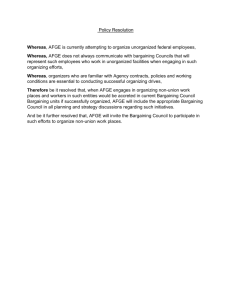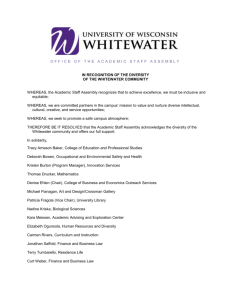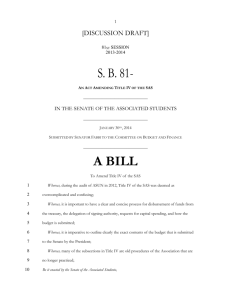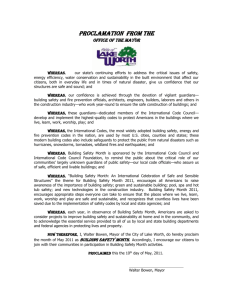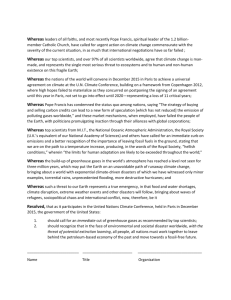Officers are prohibited from holding the office of AFGE Local President.
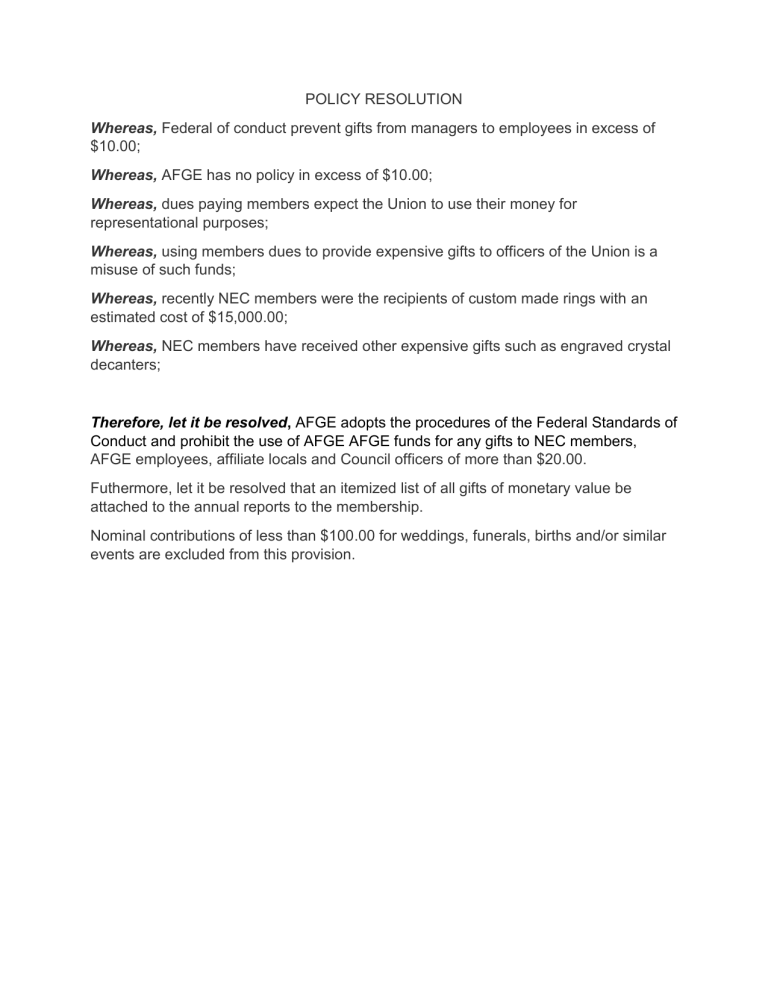
POLICY RESOLUTION
Whereas, Federal of conduct prevent gifts from managers to employees in excess of
$10.00;
Whereas, AFGE has no policy in excess of $10.00;
Whereas, dues paying members expect the Union to use their money for representational purposes;
Whereas, using members dues to provide expensive gifts to officers of the Union is a misuse of such funds;
Whereas, recently NEC members were the recipients of custom made rings with an estimated cost of $15,000.00;
Whereas, NEC members have received other expensive gifts such as engraved crystal decanters;
Therefore, let it be resolved, AFGE adopts the procedures of the Federal Standards of
Conduct and prohibit the use of AFGE AFGE funds for any gifts to NEC members,
AFGE employees, affiliate locals and Council officers of more than $20.00.
Futhermore, let it be resolved that an itemized list of all gifts of monetary value be attached to the annual reports to the membership.
Nominal contributions of less than $100.00 for weddings, funerals, births and/or similar events are excluded from this provision.
Policy Resolution
Whereas, AFGE should use membership dues in a judicious manner;
Whereas , Federal travel regulations do not generally permit Federal employees to travel first class using taxpayer money;
Whereas , AFGE should have similar rules prohibiting use of dues money for first class travel;
Whereas , some AFGE officers make it a practice to fly first class;
Whereas , such first class travel constitutes a misuse of membership dues;
Whereas, such first class travel displays arrogance and elitism;
Therefore, let it be resolved, it will be the policy of AFGE that the Federation will not reimburse 1 st class air fare unless the fare was purchased due to an emergency and the
1 st class seat is the only seat available.
Constitustional Resolution
Whereas, the constitution requires that NVPs shall be responsible and accountable to locals and councils in the district;
Whereas, Councils provide member locals significant represenational services;
Whereas, NVPs are responsible for recommending serious actions against local officers and locals when officers engage in alleged misconduct or when locals no longer properly represent their members;
Whereas, the current constitution does not require NVPs to communicate with Councils when they prefer charges against local officers or when NVPs recommend trusteeship or local charter revocation;
Whereas, any such actions will severly impact Councils in their ability to provide services to its member locals;
Whereas, AFGE should be a transparent Union;
Whereas, Councils must provide locals with additional services and asisstance if such locals have internal problems;
Therefore, let it be resolved , that Duties of the NVP, Article XII, Section 1 (b) include the following:
(8) to communicate with bargaining councils regarding serious problems in member locals that could lead to formal charges, trusteeship or charter revocation, reasonably in advance of any such action taken.
Constitutional Resolution
Whereas, the constitution permits the President of AFGE to suspend Council or Local officers prior to any investigation or trial;
Whereas, there are situations when such suspensions are necessary to prevent continuing misconduct that could adversely affect Union funds and/or representation services;
Whereas, the constitution contains broad lanuage that allows the National President to suspend an officer on subjective grounds;
Whereas, the suspension provision has been abused;
Whereas, suspending an officer of an AFGE affiliate prior to investigation or trial should only be for extremely serious offenses that violate the law;
Therefore, let it be resolved that Article IX, Section 5 (d) will be changed as follows:
SEC. 5(d). The National President shall be authorized to suspend immediately any officer of an affiliate for serious misconduct, including but not limited to incompetence, negligence, or refusal to perform duties validly assigned, or any other offense, as described in Article XXIII, Section 2 , where there is a violation of law established by a preponderance of evidence gathered by AFGE or by local, state or federal officials. where in his or her judgment the continuance in office of such officer would be inimical to the best interests of the Federation and its members.
At the time of the suspension, the National President shall serve upon the suspended officer by registered or certified mail a written notice of the suspension stating in detail the charges against the officer, and he or she also shall mail a copy of such notice and charges to the president or highest remaining ranking officers of the local. Such suspended local officer shall be tried by his or her local under the procedures established in Article XXIII. However, the National President, when he or she deems it in the best interest of the Federation, or in his or her opinion the local will not proceed promptly to trial, or cannot be expected to fairly or judiciously try the matter, may (1) appoint a trial committee or (2) select an arbitrator under existing Federal
Mediation and Conciliation Service or American Arbitration Association procedures, for the trial of the suspended officer. A suspended national bargaining council officer will be tried by a trial committee composed of three members, one of whom shall be an arbitrator selected in accordance with Article XXI, Section 7, and of the others, who shall be appointed by the National President, one shall be a national council president.
A suspended local officer shall be tried by a trial committee composed of at least three members or employees of the Federation appointed by the National President, or by an arbitrator selected by the National President. Such trials shall be conducted speedily but with reasonable time for the accused to prepare his or her defense. The procedures described in Article XXIII, Sections 4, 5 and 6 governing the conduct of hearings by local trial bodies shall be followed by the trial committee or arbitrator to assure the
accused a full and fair hearing in accordance with the basic requisites of due process.
The trial committee or arbitrator shall render a decision suspending the accused for a specific time from his or her office, removing him or her from the office, barring him or her from holding any office for a specified time, and/or suspending for a specified period of time, or removing him or her from membership, or finding him or her not guilty as accused. An officer suspended or removed from office and/or membership shall have the appeal right as set forth in Article XXIII, Section 9, after decision by the trial committee or arbitrator.
The suspension or removal of an officer shall operate only to suspend the right of such person to occupy any office or position, or perform any of the functions thereof, but all other membership rights of such individual shall remain unaffected unless and until the trial committee renders a decision affecting his or her membership rights.
Policy Resolution
Whereas, Councils need an accurate membership list of their affiliate locals in order to properly provide representational services;
Whereas, communication with bargaining unit members is an important facet of Council representation;
Whereas , Councils are involved in lobbying for legislation that affects specific agencies;
Whereas , effective lobbying requires participation of membership;
Whereas , to communicate with membership, Councils must have members contact information;
Therefore, let it be resolved the National Secretary Treasurer will send each Bargaining
Council a quarterly list of constituent local members, which will include the name of the member, the local number, city and state, personal email addresses and cell phone numbers, in electronic format.
Constitutional Resolution
Whereas, the constitution permits the AFGE National President to suspend the charter of a local or Council;
Whereas , the constitution has subjective criteria that the National President can use to revoke a local or Council charter;
Whereas , such a radical action should only be undertaken in rare cases;
Whereas, the constitution should only permit charter revocation for specific reasons;
Therefore, let it be resolved that Article IX, Section 5 (c) will be changed as follows:
SEC. 5(c). The National President shall be authorized and empowered to revoke or suspend, with the approval of the NEC, the charter of any council or local when the
National President has proof that such affiliate body has disbanded , has ceased to be beneficial to the Federation, is in such disarray that its continuation will be prejudicial to the objectives and best interests of the Federation, or when a local is delinquent in paying its monthly per capita tax, assessments or other indebtedness for at least six months, as provided for in Article XXIV. Any member of the local or council whose charter is suspended or revoked under this subsection may challenge the action by mailing a written statement, setting forth the grounds for the challenge, to the National President within 15 days after the suspension or revocation. The National President will order a hearing on such challenge, and such hearing and appeal procedures will be conducted in accordance with the procedures set forth in Section 5(b) of this Article.
Policy Resolution
Whereas, the current AFGE policy permits a Council President to determine local jurisdiction of newly organized units under the Council jurisdiction;
Whereas, the government is organized differently than AFGE;
Whereas, NVP’s use District considerations to make such jurisdictional decisions that often do not address representational issues;
Whereas, Councils have a broader, national perspective regarding the most favorable local structure to mirror agency organizations and/or divisions.
Therefore, let it be resolved if the National President revokes the charter of a local in a bargaining unit Council, the Council President will be empowered to decide the local jurisdiction for the members of the former local.
Constitutional Resolution
Whereas, NVPs are highly paid Union officials;
Whereas, NVPs are responsible for managing and overseeing the activity of all locals in their geographic jurisdiction;
Whereas, such responsibilities are full time jobs;
Whereas, the responsibilities of being a Local President is also a full time job;
Whereas, AFGE members expect their NVPs to concentrate completely on the job that they are paid for, managing and overseeing the Locals in the District;
Whereas, engaging in Local President responsibilities and duties would adversely affect the ability of an NVP to perform their primary job;
Whereas, the current constitution does not prohibit an NVP rom holding multiple Union positions;
Whereas, some current NVPs are also Local Presidents;
Therefore, let it be resolved that Article VII Section 3 will be changed as follows:
The entrance salary of the officers shall be consistent with the Classification Act for
Federal Employees:
(a) National President Executive Level IV
(b) National Secretary-Treasurer GS-15
(c) National Vice President for Women and Fair Practices GS-14
(d) National Vice Presidents GS-14 except that an elected officer shall not suffer any loss in pay if occupying a Federal or
District government position when elected. The in-grade step raises for the prescribed grades, if any, shall apply.
Pay increases for all national officers will be in accordance with the Federal Employees
Pay Comparability Act of 1990 (FEPCA).
Officers are prohibited from holding the office of AFGE Local President.
Constitutional Resolution
Whereas , the constitution allows the National President to impose trusteeship and remove a Locals’ officers;
Whereas , neither the constitution nor AFGE procedures require that the notice be specific and contain all evidence relied upon for the imposition of trusteeship;
Whereas, neither the constitution or AFGE procedures allow the Council for the trusteed local to engage in discovery;
Whereas , there is no constitutional requirement to notify a Council if one of the constituent locals has been given notice of trusteeship;
Whereas, if a trusteed local is in a Council, the Council should have the ability to designate one member of the hearing panel;
Whereas , hearing panels have been known to deviate from their sole responsibilities of deciding whether trusteeship is appropriate;
Whereas , AFGE has given locals inadequate notice of a trusteeship hearing;
Whereas, a trusteeship hearing should be located within the geographic jurisdiction of the local/Council;
Whereas , neither the constitution or AFGE procedures requires AFGE to notify
Local/Council representatives in advance of the witnesses that will be called by AFGE at the hearing;
Whereas, AFGE is not always timely in implementing hearing panel decisions;
Therefore, let it be resolved that Article IX Section 5(b)(5) and 5 (b)(6) will be changed as follows:
S EC . 5(b)(5). The National President shall remove incumbent officers and give notice of the imposition of trusteeship to the membership of the local or the constituent locals of the council within five days, providing the time, date, and place of the trusteeship hearing. The notice should include copies of all evidence relied upon for the imposition of trusteeship including specific legal citations if the reason for trusteeship is a violation of law. A copy of the notice and all attachments will also be sent to the appropriate bargaining Council President(s) if the local is a member of a bargaining council(s).
The National President shall
appoint a three member trusteeship hearing panel. One hearing panel member will be the Council President or designee if the local is a member of a bargaining Council. The hearing panel should confine its decision to the issue of whether or not to uphold the trusteeship.
The hearing shall take place within 60 days , but no sooner than 30 days in the vicinity of the local or council headquarters . with the exception of trusteeships imposed for chronic (three months) per capita tax delinquency which will be held in the National
Office. Notice of the actual hearing dates to the local/council officers will be at least 21 days before the first day of the hearing. AFGE and the trustee local’s counsel will make every reasonable effort to select mutually acceptable hearing dates. The hearing shall not be scheduled on immediately before, after or on a holiday. Extensions may be granted to the local/council officers within the 60 day time frame granted for good and sufficient cause. Officers of the local/council put in trusteeship and their hearing representative will be notified at least 14 days in advance of the hearing regarding witnesses that AFGE will call at the hearing. Counsel for the trusteed local/council can obtain additional information and/or evidence through discovery.
Any affected member may appear at the hearing in person or by electronic means, and the hearing panel will receive testimony and documentary evidence from those attending or their representatives.
S EC . 5(b)(6). The hearing panel shall issue its decision within 30 days of the close of the hearing to ratify or rescind the trusteeship, and the National President shall notify the membership of the local or the constituent locals of the council . Failure to issue a decision within the 30 day timeframe will preclude the imposition of the trusteeship. If the local in trusteeship is a member of a bargaining council(s), the appropriate Council President(s) will also receive notice of the hearing decision from the National President. Actions necessary to effectuate the panels’ decision (e.g. reinstatement of officers, effective date of such reinstatement, etc…) will be included in the President’s notice.
Any affected member may file an appeal within 15 days of notification to the National
Secretary-Treasurer for appeal to the next AFGE National Convention.
Constitutional Resolution
Whereas , the Constitution allows NEC members to prefer charges against members of
AFGE without investigation;
Whereas , no other AFGE officials other than an NEC member can prefer charges against an AFGE member without an investigation;
Whereas, due process should require that all charges be investigated by an investigative committee that must find probable cause of an Article XXIII violation prior to scheduling of a trial;
Wherea s, abuses have occurred because the Constitution permits NEC members to prefer charges against members without an investigation;
Whereas , the NVP of the 5 th District preferred 39 charges against the President of SSA
Local 4056;
Whereas, none of the charges were investigated;
Whereas , many preferred charges had factual errors;
Whereas , these charges included such trivial allegations that the President used a different conference call # than the number preferred by the Secretary-Treasurer;
Whereas, investigation would have in all likelihood resulted in the dismissal of most if not all of the 39 charges;
Whereas , failure to investigate the charges led to unnecessary expenditure of AFGE resources to schedule and convene a trial;
Whereas , investigative committees that are selected for charges preferred by an NVP should be from locals outside of the NVP’s District to insure fairness;
Wherea s, the Constitution does not insure members get copies of supporting evidence when charges are filed against them;
Whereas , the current Constitution contains no time limit for investigations where NEC members prefer charges;
Whereas , investigative committees selected by Locals to deal with local charges require investigations to be concluded in 120 days;
Whereas, the Constitution contains no fair procedure for selecting trial committees when preferred charges result in probable cause for trial,
Whereas , arbitration is generally recognized in labor as a fair procedure to litigate disputes,
Whereas , neither the Constitution nor AFGE procedures provide due process and discovery rights to the recipients of charges,
Therefore, let it be resolved that Article XXIII Section 3 will be changed as follows:
SEC. 3. Charges may be preferred by the National President, the National Executive
Council, the National Vice President having jurisdiction over the local of which the accused is a member, or by a committee of investigation of the local. All charges under this Article must be investigated. Charges preferred by an NVP will be referred to a Committee of Investigation selected by the National
President. Investigation Committee members will be local members from districts outside the district of the NVP preferring the charges. If the NEC or NVP prefers charges, the National President will select a Committee of
Investigation. Members will be from locals outside the district of the accused. Any member may request conflict resolution or bring charges by first filing them with the local of which the accused is a member, and the charges shall be investigated by a committee of investigation appointed by the local president or by the majority of the local Executive Board if the local president is being accused. If it is the local president who brings charges against a member, then the local Executive Board shall appoint a committee of investigation. If a member of the local Executive Board is the accused member, he or she may not vote in the selection of the committee of investigation. No member of the Executive Board may serve on the committee of investigation. The local committee of investigation shall conduct and complete the investigation within 120 days of the filing of charges. If the committee of investigation finds probable cause and cannot settle the matter informally or through the conflict resolution process, it shall prefer charges upon the accused. Such charges shall be in writing and shall be served upon the accused by registered or certified mail at his or her last known address and the local of which the accused is a member also shall be served at its office or address of its highest ranking officer. The charges shall contain an allegation of the facts describing the nature of the offenses charged and copies of all supporting evidence.
All Committees of Investigation shall conduct and complete their investigation within 120 days of the filing of the charges. Trials of charges initiated by an NVP, NEC or National President where an investigation has found probable cause will be decided before an impartial arbitrator. Due process rules will apply to the trial (e.g. the accused is entitled to discovery and sufficient advance notice of trial witnesses).
Constitutional Resolution
Whereas, the Constitution permits the National President to immediately put a Local or
Council in trusteeship before a hearing if the officers of the Local or Council fail to agree to mediation of internal disputes;
Whereas, this provision has been interpreted by AFGE to allow immediate Trusteeship if even one officer declines mediation,
Whereas if the declination of mediation is not universal, only those who refuse mediation should receive sanctions, not the entire local;
Whereas , the appropriate remedy for individual refusal to accept mediation is the filing of Article XXIII charges- not trusteeship;
Therefore, let it be resolved that Article IX Section 5(b)(1) will be changed as follows:
In all cases but secession from AFGE or confirmed loss of leadership, or where the all local or council officers fail s to agree to mediation, the National President shall be authorized and empowered with the approval of the NEC, to place any council or local under trusteeship only after the following procedures have been followed:
Constitutional Resolution
Whereas . The current constitution allows the President and the NEC to decide whether
AFGE will merge with another International Union;
Whereas , Councils, Local and members have no voice under the Constitution regarding such mergers;
Whereas
, AFGE’s leadership is contemplating merger with NALC;
Wherea s, an action of the magnitude of a merge with another Union should require the approval of the delegates of a Convention;
Whereas , merger between Conventions should also require the approval of AFGE locals;
Whereas, delegates and local Presidents should be informed about the pros and cons of a merger before a ratification vote;
Therefore, let it be resolved that Article XXVII Section 2 will be changed as follows:
To effectuate this policy, the National Executive Council, upon recommendation of the National President, shall have authority to approve recommend such mergers. In implementation of mergers, the National President shall have the authority, with the approval of the NEC, without regard to any other provision of this
Constitution, to create new officer positions with voting rights on the NEC and new staff positions in the National Headquarters and in the field, where the creation of such positions is necessary for consummation of a merger.
Furthermore, let it also be resolved that the following sections be added.
Section 3. Any merger with another union will be effectuated by a ratification vote of the delegates at the AFGE convention. Such a vote will include any proposed new officer structure with voting rights on the NEC and new staff positions in the National Headquarters and Field where the creation of such positions is necessary for consummation of a merger.
Section 4. If the NEC believes that a merger opportunity that is of benefit to the Federation will be lost by waiting until the next AFGE convention, the
NEC can direct that a proposed ratification vote be conducted by mail ballot of all AFGE locals in good standing. Local Presidents of AFGE locals will be entitled to vote their membership strength to approve or deny such merger. Membership strength will be determined by the average
membership for a 12 month period ending 3 months before the mailing of
the ballot.
Section 5. Any merger notification proposal at either the National
Convention or mail ballot of Local Presidents will provide information regarding the impact of the merger on current AFGE representational services and the cost of such merger.
Section 6. Any additional revenue received from per capita tax of merged unions will be subject to AFGE constitutional earmarks.

